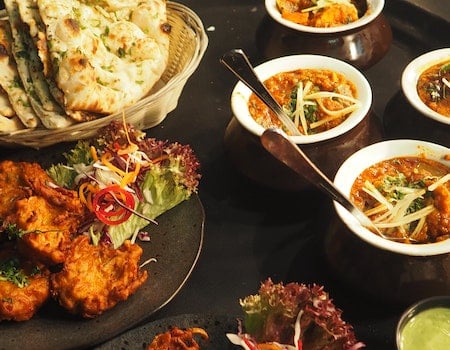Common Thai Phrases for All Occasions
Did you know that Thailand’s official nickname is The Land of Smiles? After visiting this breathtakingly beautiful country last summer, I can confirm that this is an apt description of the stunning Southeast Asian country, known for its lush jungles, vibrant cities, and happy people. From the bustling streets of Bangkok to the pristine beaches of Koh Phi Phi, it’s widely known that Thailand offers something for everyone. But to truly experience all this paradisiac country has to offer, you’ll need to learn a few common Thai phrases.
Sure, if you speak English, you’ll be able to get around, but learning a few essential expressions in this ancient language will help you make connections with locals and understand customs more deeply. And, isn’t this what traveling is all about?
Table of Contents
→Sign Up Now: Free Trial Thai Lesson With a Native Teacher!←
Thai Greetings
One of the most common phrases in Thai culture is ‘Sawasdee’ which means hello. This polite expression, spoken by both men and women, can be used to greet friends or strangers alike. If you’re visiting someone’s home, you may also hear ‘Yàak jàn’ which is used to express appreciation for the invitation.

Then, of course, there are different greetings depending on the time of day! ‘Sà-wàt-dee bpra-chá’, for example is used when greeting someone in the morning, while ‘Sà-wàt-dee săa’ is common during the evening.
Oh, and if you’re going to bed, the most common phrase in Thai is ‘Sà-wàt-dee ráa’, which literally means ‘Good night’.
Do you expect or hope to see the other person the following day or very soon? Then you can use common phrases in Thai such as ‘Láa-kon’ or ‘Bplào jeb’, which essentially mean ‘See you later’.
Roundup: Common Thai Greetings
Sawasdee = Hello
Yàak jàn = Thank you for inviting me
Sà-wàt-dee bpra-chá = Good morning
Sà-wàt-dee săa = Good evening
Sà-wàt-dee ráa = Good night
Láa-kon = See you soon
Bplào jeb = See you later
Common phrases in Thai for checking in
When it comes to common phrases in Thai for checking in at a hotel, you’ll want to use ‘Că-kŏn’ which literally means ‘I am here’. It may seem like a weird phrase to use in this situation, but it is common among Thai people!
From then on, you needn’t worry. If you’re staying at an important hotel, the staff will be able to tell that you are an English speaker and they will use your language. However, if you feeling especially brave, why not do the whole procedure in English?

All you have to do is follow these steps:
- Start by stating your name in the local language: ‘Că-kŏn pŏm châi’ translates to ‘I am here, my name is…’.
- Say that you have a reservation: Use common phrases in Thai such as ‘Că-kŏn đaai rót’ which means ‘I have a reservation’, or ‘Că-kŏn náam bâan’ which means ‘I have a booking’.
- Last, say how you’re going to pay. If you’re going to pay with cash, use ‘Că-kŏn mâi têe kàat’; if you’re paying with a card, say ‘Că-kŏn mâi têe kàat dèk’.
Roundup: Common phrases in Thai for checking in
Că-kŏn = I am here
Că-kŏn pŏm châi = I am here, my name is…
Că-kŏn đaai rót = I have a reservation
Că-kŏn náam bâan = I have a booking
Că-kŏn mâi têe kàat = I will pay with cash
Că-kŏn mâi têe kàat dèk = I will pay with a card
Asking for Help
Would you like to ask for directions? Has anyone in your group had an accident? Do you just need some advice about the local area? Then common phrases in Thai for asking for help may come in handy.
When it comes to asking for help in general, the most common expression is ‘Châi đŭa năai?’ (‘Can you help me?’). Whether you need help finding the right train or you have lost your wallet, this simple be enough to catch people’s attention.
However, if you need someone to show you the way, then common phrases in Thai for asking for directions include ‘Yŏo kaa-ngàan bpai mâi?’ (‘Can you show me where this is?’ and ‘Pŏm năam kŏr mâi yŏo bpai?’ (‘Can you tell me how to get there?’).
Oh, and if you are dealing with an emergency situation like a medical issue, phrases in Thai like ‘Phŏm phăe-kâi’ (‘Someone’s hurt’) ‘Chêu đaai kâo’ (There’s been an accident) will surely come in handy.
Now, of course, things won’t normally get so dramatic. Most of the times, all you need is some expert advice about the local area. In that case, just ask ‘What are the best restaurants / spots / museums in town?” (R̂ān xāh̄ār / cud / phiphiṭhp̣hạṇṯh̒ thī̀ dī thī̀s̄ud nı meụ̄xng khụ̄x xarị?) and the locals will surely be more than happy to tell you all about their favorite places.
Roundup: Common phrases in Thai for asking help
Châi đŭa năai? = Can you help me?
Yŏo kaa-ngàan bpai mâi? = Can you show me where this is?
Pŏm năam kŏr mâi yŏo bpai? = Can you tell me how to get there?
Phŏm phăe-kâi = Someone’s hurt
Chêu đaai kâo = There’s been an accident
R̂ān xāh̄ār / cud / phiphiṭhp̣hạṇṯh̒ thī̀ dī thī̀s̄ud nı meụ̄xng khụ̄x xarị? = What are the best restaurants / spots / museums in town?
Eating Out
It’s no secret that Thai food is some of the best cuisine in the world. From the iconic Pad Thai to the unmistakable flavor of Tom Yum Soup, Thailand is full of delicious dishes that are just waiting to be tried. Characterized by its balance of sweet, salty and sour flavors, Thai cuisine is also as diverse and exciting as the landscapes of this vibrant country.
But before you can start enjoying the food, make sure you write down these common phrases in Thai for food lovers.
Let’s start with the basics:
For those adventurous souls who are open to suggestions and love to try new flavors, a great question to memorize is ‘Châi đaai khăo naam?’ (What are the specials today?)

Now, if you want to get a bit more specific or you’re just a bit careful about what you eat, you can ask for the common ingredients of Thai dishes by saying ‘Châi đaai dĕe mŏr phạw lǎam?’ (What ingredients are in this dish?).
And, of course, this section wouldn’t be complete without a few common phrases in Thai to order food and ask for your check. ‘C̄hạn phr̂xm thī̀ ca s̄ạ̀ng sụ̄̂x’ (I’m ready to order), ‘Chăn đăn dŏo’ (I’ll have this one), and ‘Khx bıs̄er̆c d̂wy kh̀a’ (The check, please) are all expressions you’ll want to remember.
Roundup: Common phrases in Thai for eating out
Châi đaai khăo naam? = What are the specials today?
Châi đaai dĕe mŏr phạw lǎam? = What ingredients are in this dish?
C̄hạn phr̂xm thī̀ ca s̄ạ̀ng sụ̄̂x = I’m ready to order
Chăn đăn dŏo = I’ll have this one
Khx bıs̄er̆c d̂wy kh̀a = The check, please
Thailand is a country of beautiful landscapes, delicious food and paradisiac beaches. But more importantly, it’s a country full of friendly, hospitable people who are more than happy to help out visitors.
If you want to make sure your visit to Thailand will be as smooth as possible and pay the locals back for their hospitality, why not take a few lessons to learn some common phrases in Thai and practice the sounds of this beautiful language?
→Sign Up Now: Free Trial Thai Lesson With a Native Teacher!←
At Listen & Learn, we offer you a range of tailored courses and lesson packages to choose from, so don’t wait any longer and send us a quick message so we can arrange the best course for you! In fact, if you contact us by clicking on this link, we can offer you a free trial lesson, with no strings attached.


